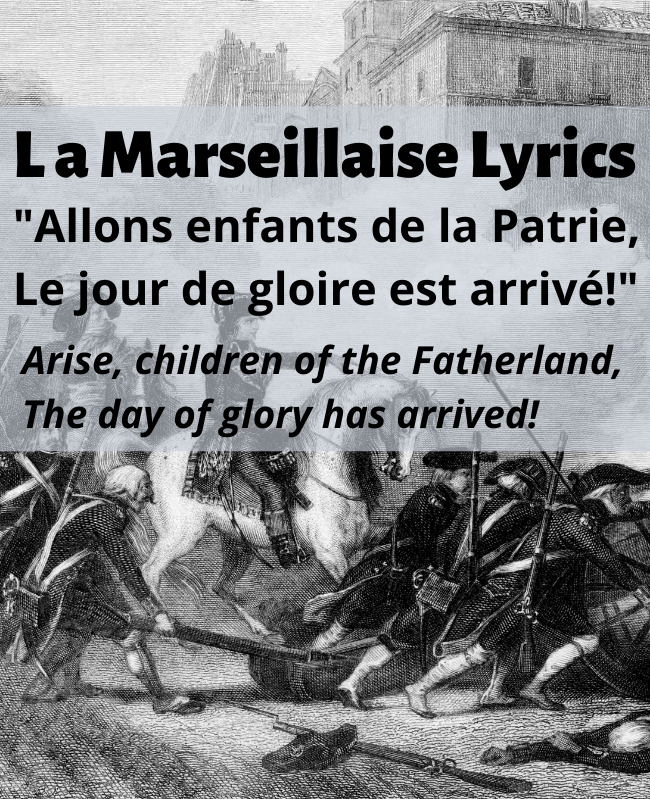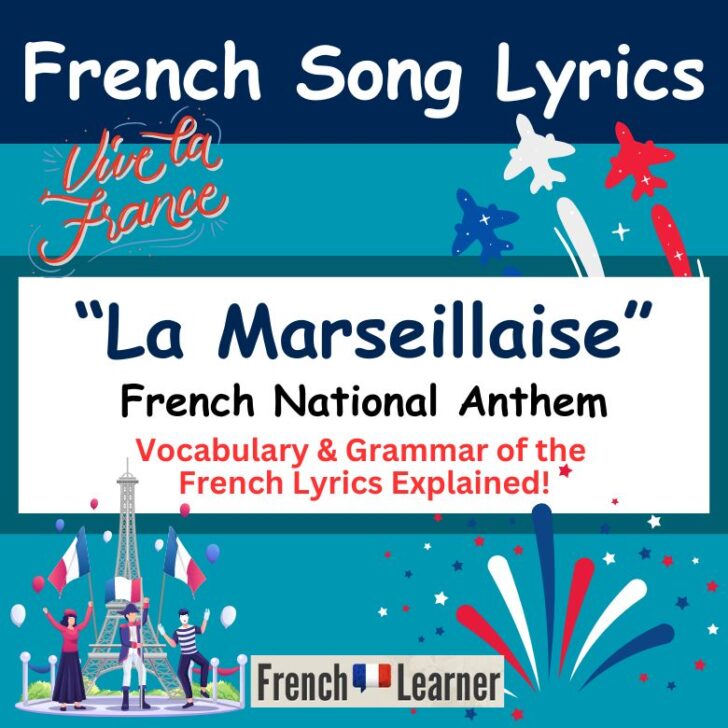La Marseillaise is the national anthem of France. The Marseillaise’s lyrics are call to arms to unite the French citizenry against the monarchy: “Allons enfants de la Patrie, Le jour de gloire est arrivé !” (Arise, children of the fatherland; The day of glory has arrived.). This post explores both the meaning, vocabulary and grammar of the French lyrics.

La Marseillaise – National Anthem of France
La Marseillaise history
La Marseillaise was first written 1792 by Claude Joseph Rouget de Lisle and was originally called Chant de guerre pour l’Armée du Rhin or “War Song for the Army of the Rhine”.
The song was written in Strasbourg at the start of an invasion of north-western France by Prussia and Austria. In 1795, La Marseillaise was adapted as the anthem of the First Republic. The song got its name when pro-revolutionary marchers called fédérés from Marseille sung the song in Paris.
During the early 19th century the song lost importance under Napoleon I, Louis XVIII and Charles X. However, in 1897 the song was adopted as the official national anthem of France. Over the years the song has come to symbolize the French revolution and revolutions worldwide.
Listen to la Marseillaise
La Marseillaise lyrics with English translation
Allons enfants de la Patrie,
Le jour de gloire est arrivé!
Contre nous de la tyrannie,
L’étendard sanglant est levé, (bis)
Entendez-vous dans les campagnes
Mugir ces féroces soldats?
Ils viennent jusque dans vos bras
Égorger vos fils, vos compagnes!
Arise, children of the Fatherland,
The day of glory has arrived!
Against us tyranny
Raises its bloody banner (repeat)
Do you hear, in the countryside,
The roar of those ferocious soldiers?
They’re coming right into your arms
To cut the throats of your sons, your companions!
Aux armes, citoyens,
Formez vos bataillons,
Marchez, marchez!
Qu’un sang impur
Abreuve nos sillons!
To arms, citizens,
Form your battalions,
March! March!
That an impure blood
Waters our furrows!
Amour sacré de la Patrie,
Conduis, soutiens nos bras vengeurs
Liberté, Liberté chérie,
Combats avec tes défenseurs! (bis)
Sous nos drapeaux que la victoire
Accoure à tes mâles accents,
Que tes ennemis expirants
Voient ton triomphe et notre gloire!
Sacred love of the Fatherland,
Lead, support our avenging arms
Liberty, cherished Liberty,
Fight with thy defenders! (repeat)
Under our flags, shall victory
Hurry to thy manly accents,
That thy expiring enemies,
See thy triumph and our glory!
Aux armes, citoyens…
To arms, citizens…
Que veut cette horde d’esclaves,
De traîtres, de rois conjurés?
Pour qui ces ignobles entraves,
Ces fers dès longtemps préparés? (bis)
Français, pour nous, ah! quel outrage
Quels transports il doit exciter!
C’est nous qu’on ose méditer
De rendre à l’antique esclavage!
What does this horde of slaves,
Of traitors and conjured kings want?
For whom are these vile chains,
These long-prepared irons? (repeat)
Frenchmen, for us, ah! What outrage
What fury it must arouse!
It is us they dare plan
To return to the old slavery!
Aux armes, citoyens…
To arms, citizens…
Quoi! des cohortes étrangères
Feraient la loi dans nos foyers!
Quoi! Ces phalanges mercenaires
Terrasseraient nos fiers guerriers! (bis)
Grand Dieu! Par des mains enchaînées
Nos fronts sous le joug se ploieraient
De vils despotes deviendraient
Les maîtres de nos destinées!
What! Foreign cohorts
Would make the law in our homes!
What! These mercenary phalanxes
Would strike down our proud warriors! (repeat)
Great God ! By chained hands
Our brows would yield under the yoke
Vile despots would have themselves
The masters of our destinies!
Aux armes, citoyens…
To arms, citizens…
Français, en guerriers magnanimes,
Portez ou retenez vos coups!
Épargnez ces tristes victimes,
À regret s’armant contre nous. (bis)
Mais ces despotes sanguinaires,
Mais ces complices de Bouillé,
Tous ces tigres qui, sans pitié,
Déchirent le sein de leur mère!
Frenchmen, as magnanimous warriors,
You bear or hold back your blows!
You spare those sorry victims,
Who arm against us with regret. (repeat)
But not these bloodthirsty despots,
These accomplices of Bouillé,
All these tigers who, mercilessly,
Rip their mother’s breast!
Aux armes, citoyens…
To arms, citizens…
La Marseillaise – French lyrics vocabulary and grammar
In the following section we explain the vocabulary and grammar of the chorus of La Marseillaise.
Allons enfants de la Patrie
This line translates to “Arise, children of the Fatherland”. “Allons!” translates literally to “let’s go” and is the imperative form of aller (to go) in the first-person plural (nous) form.
Le jour de gloire est arrivé!
This line translates to “The day of glory has arrived”. In French, gloire translates to both fame and glory. The verb arriver means “to arrive” and uses être (to be) as its auxiliary verb in the passé composé, a commonly used French past tense.
Contre nous de la tyrannie
This line translates to “Against us tyranny” or more loosely “We are against tyranny”, referring to the monarchy. The preposition contre means against in French. The English word “tyranny” comes directly from the French tyrannie.
L’étendard sanglant est levé
This line translates to “Raises its bloody banner”. The noun étendard can also translate to flag or standard.
Entendez-vous dans les campagnes
This line translates to “Do you hear, in the countryside?”. Entendez-vous is is the second-person plural (vous) form of the verb entendre, a regular -re verb meaning “to hear”. Campagne translates to countryside or rural area.
Mugir ces féroces soldats?
This line translates to “The roar of those ferocious soldiers?”. The verb mugir translates to “to roar” or “to howl” and “to blare”.
Ils viennent jusque dans vos bras
This line translates to “They’re coming right into your arms”. Viennent is the third-person-plural for of venir (to come). Vos is a possessive adjective meaning “your”. Bras translates to “arm”. The preposition jusqu’à translates to “until”.
Égorger vos fils, vos compagnes!
This line translates to “To cut the throats of your sons, your companions”. The noun fils translates to “son”. The verb égorger translates to “to cut or slit the throat”. The English word companion comes directly from the French word compagne, meaning companion or partner.
Aux armes, citoyens, Formez vos bataillons
These two lines translate to “To arms, citizens, Form your battalions”. The noun citoyen translates to citizen. This word is important in the French Revolution as the people saw themselves as citizens and not subjects to the monarchy. The English word battalion comes directly from the French word bataillon.
Marchez, marchez!
This line translates to “march, march!”. The French verb marcher means to march, function and walk.
Qu’un sang impur, Abreuve nos sillons!
These two lines translate to “That an impure blood, Waters our furrows!”. The verb abreuver means “to water” or “to give water to”. Sillon translates to furrow, groove or crease.


